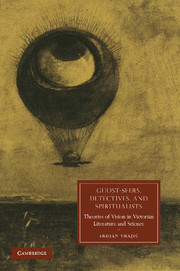Book contents
- Frontmatter
- Contents
- Acknowledgments
- List of abbreviations
- Introduction
- PART I OUTER VISION, INNER VISION: GHOST-SEEING AND GHOST STORIES
- 1 Contextualizing the ghost story
- 2 The rise of optical apparitions
- 3 Inner vision and spiritual optics
- 4 “Betwixt ancient faith and modern incredulity”
- PART II SEEING IS READING: VISION, LANGUAGE, AND DETECTIVE FICTION
- PART III INTO THE INVISIBLE: SCIENCE, SPIRITUALISM, AND OCCULT DETECTION
- Coda
- Notes
- Bibliography
- Index
- CAMBRIDGE STUDIES IN NINETEENTH-CENTURY LITERATURE AND CULTURE
4 - “Betwixt ancient faith and modern incredulity”
Published online by Cambridge University Press: 06 July 2010
- Frontmatter
- Contents
- Acknowledgments
- List of abbreviations
- Introduction
- PART I OUTER VISION, INNER VISION: GHOST-SEEING AND GHOST STORIES
- 1 Contextualizing the ghost story
- 2 The rise of optical apparitions
- 3 Inner vision and spiritual optics
- 4 “Betwixt ancient faith and modern incredulity”
- PART II SEEING IS READING: VISION, LANGUAGE, AND DETECTIVE FICTION
- PART III INTO THE INVISIBLE: SCIENCE, SPIRITUALISM, AND OCCULT DETECTION
- Coda
- Notes
- Bibliography
- Index
- CAMBRIDGE STUDIES IN NINETEENTH-CENTURY LITERATURE AND CULTURE
Summary
My grouping of Carlyle, Crowe, and Ruskin in the previous chapter is not meant to suggest that their statements about vision are cast from the same mold. Rather, I wanted to draw attention to a few facets of an alternate, counter-retinal way of conceptualizing vision, and a model of the observer whose proponents, in various ways, resisted the reduction of vision to physiological terms. This alternate model, I have suggested, had its problems, not least of which was its entanglement in corporeality. Carlyle's reliance on optics to describe moral and spiritual disorientation implies that the conceptual framework for discussions about vision, whether it be inner or outer, spiritual or corporeal, rests on the sciences of the body: spiritual optics is a version of physiological optics. Similarly, Ruskin's claim that sight is a “spiritual phenomenon,” and only secondarily a physiological one, is compromised by his foregrounding of corporeality: “the soul of the eye” has no other access to the visible world than through the bodily organ with its metric vision. Crowe downplays the evidential contributions of the bodily senses, yet is unwilling to sacrifice all empirical “evidence from without” for the metaphysics of interiority and intuition. “[T]he power of spiritual seeing, or intuitive knowing” (NN, p. 20) must be supplemented with evidence gathered through the exterior senses.
- Type
- Chapter
- Information
- Ghost-Seers, Detectives, and SpiritualistsTheories of Vision in Victorian Literature and Science, pp. 45 - 64Publisher: Cambridge University PressPrint publication year: 2010



